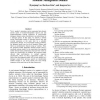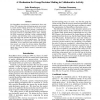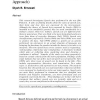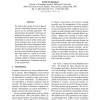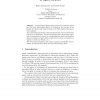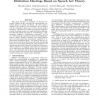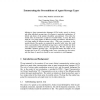114
click to vote
ATAL
2011
Springer
14 years 2 months ago
2011
Springer
In this paper, we merge speech act theory, emotion theory, and logic. We propose a modal logic that integrates the concepts of belief, goal, ideal and responsibility and that allo...
110
click to vote
AICOM
2008
15 years 2 months ago
2008
Since speaker's intentions can be represented into domain actions (pairs of domain-independent speech acts and domain-dependent concept sequences) in goal-oriented dialogues,...
101
click to vote
AAAI
2000
15 years 3 months ago
2000
The SharedPlans formalization of collaboration (Grosz and Kraus 1999) stipulates that collaborating agents must commit to certain decision-making processes, but it does not specif...
101
click to vote
WSC
2004
15 years 3 months ago
2004
This research investigates Speech Acts performed in the war film Platoon. It aims at finding details about the types of speech acts, their form and how they are expressed by the i...
143
click to vote
CLIMA
2006
15 years 3 months ago
2006
If we are to take the notion of speech act seriously, we must be able to treat speech acts as acts. In what follows, I will try to model changes brought about by various acts of co...
137
click to vote
ACL
2006
15 years 3 months ago
2006
We analyze the concept of focus in speech and the relationship between focus and speech acts for prosodic generation. We determine how the speaker's utterances are influenced...
135
click to vote
DEON
2006
Springer
15 years 5 months ago
2006
Springer
A general logical framework is presented to represent speech acts that have institutional effects. It is based on the concepts of the Speech Act Theory and takes the form of the FI...
106
click to vote
ICRE
1996
IEEE
15 years 6 months ago
1996
IEEE
This paper discusses a technique to structure utterance records of the meetings for requirements elicitation based on speech act theory. To elicit requirements to the system to be...
119
click to vote
AIED
2009
Springer
15 years 6 months ago
2009
Springer
Automatic tools for analyzing student online discussions are highly desirable for better assistance and scaffolding. This paper presents an approach for automatically identifying s...
AI
2003
Springer
15 years 7 months ago
2003
Springer
Agent communication languages (ACLs) invoke speech act theory and define individual message types by reference to particular combinations of beliefs and desires of the speaker (fea...

